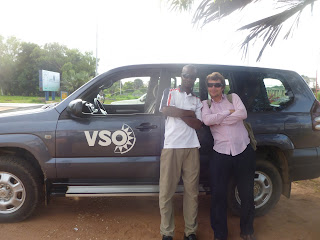
On pretty much every street corner of the Kombos one can find a group of guys sitting around, relaxing and letting the day pass them by. If you’re lucky enough to befriend a few of them you can join in the regular ritual of ataya drinking – the local version of green tea. The locals use strong, affordable Chinese tea and then put in the pot about 5-6 spoons of sugar for each person drinking. The whole tea making/drinking process is, as you would expect from people with time on their hands, very drawn out. The tea is brewed about three or four times, and is then passed from glass to glass a couple more times (as is illustrated in the photo above). This creates a “bubbly effect”, which I’m told greatly enhances the flavour. The result is extremely tasty and certainly has an energy-giving kick. Another type of tea to add to my repertoire methinks!

Beginning at Work - I've just had my first couple of days at my new workplace, the Ministry of Education. First impressions are that I should have everything I need to be comfortable in my workplace – we have fans and internet (when the electricity is on), so relatively speaking I've done very well! On my first day I was taken around to meet all the staff and all the departments. I’m in a massive complex, so remembering everyone’s name will be a challenge (but very much expected! People look very disappointed if you forget, and will often get straight to the point – “hi Robert, do you remember my name?”). My new neighbours include the heads of curriculum for all the subjects in Gambia, so I have the pleasure of break time tests of my French language with the nationwide head of French! I hope to find out more about other intriguing departments such as Islamic Studies and Disability/Special Needs in the coming weeks. I’ll tell you more about my own particular role amongst all of this in the next blog post.

Set Setal – otherwise know as National Clean-Up Day [insert fanfare]. Yes, every last Saturday of the month, by order of the government, a full morning is dedicated to the clean-up of one’s house and neighbourhood. All the shops are closed and the roads can only be used by people with special permission. The result was an eerily quiet city centre, with all roads deserted and all shops boarded up. Everyone was indeed at home cleaning their compounds. Even the police, army and prison service got in on the act, cleaning up the highways of the city. In some ways Set Setal seems like a great initiative, forcing everyone to care for their neighbourhoods. I wonder how this would go down in other countries...
The Wedding Dancers – after doing my own bit of cleaning I was fortunate enough to be invited to a bride’s wedding celebration by a local Senegalese family. As the weather was positively stormy we all crowded into a small house for what turned out to be an evening of music and dance. Drummers drummed and the obligatory whistle-blowers whistled. It was an explosion of noise, which seemed to go on non-stop. A brief lull occurred when the bride entered the middle of the room – all the guests would come up and offer her money.
The rest of the evening revolved around people taking turns going into the middle of the room to dance. The dance was mainly done individually, and involved a variety of short movements. Of course yours truly was dragged in on the act, much to the amusement of everyone present, including one of the cleaners from work – much hilarity was had in the office the following Monday. I think my mix of Polish folk dancing and the African beat worked relatively well... The event was attended mostly by women (the bride’s family and friends), all dressed in their finest dresses. When dancing they produced a beautiful cocktail of swirling colours. After several hours we returned home, an evening well spent.
Lots of love from the fresh and newly cleaned capital of Gambia. A big hug to you all,
Robert









 The Day’s Entertainers – Ndemban’s Women’s Band, a really energetic and cheerful bunch! The older generation of women in the village had formed a large dance troupe, which filled the whole of the surrounding area with noise and singing. They seemed to have a repertoire of hundreds of songs, many of which I was told were simply made up on the spot (one person would start singing and then the others would soon follow). Most of the songs were patriotic, focusing on the beauty of Gambia or the greatness of its president.
The Day’s Entertainers – Ndemban’s Women’s Band, a really energetic and cheerful bunch! The older generation of women in the village had formed a large dance troupe, which filled the whole of the surrounding area with noise and singing. They seemed to have a repertoire of hundreds of songs, many of which I was told were simply made up on the spot (one person would start singing and then the others would soon follow). Most of the songs were patriotic, focusing on the beauty of Gambia or the greatness of its president.








